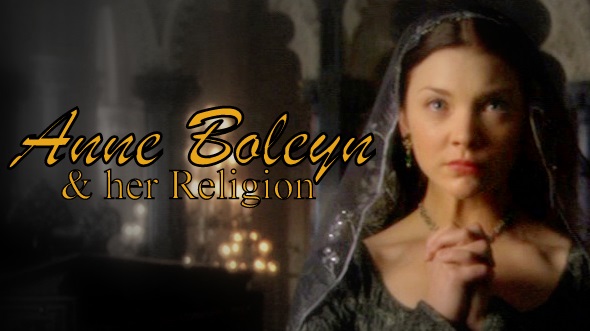Anne Boleyn and Religion
Jump to navigation
Jump to search
The Facts
Primary Sources
Secondary Sources
The Facts
| Date or Circa | Event | Source |
Primary Sources
Author | Quote | Source |
| George Boleyn - dedication to his sister which prefaced a work by french reformer Jacques Lefevre d’Etaples‘Les Epistres et Evangiles des cinquante et deux sepmaines de I’an’ (The Epistles and Gospels for the Fifty-two Weeks of the Year) | ‘To the right honourable lady, the Lady Marchioness of Pembroke,[[[Anne Boleyn]]] her most loving and friendly brother sendeth greetings. Our friendly dealings, with so divers and sundry benefits, besides the perpetual bond of blood, have so often bound me, Madam, inwardly to love you, that in every of them I must perforce become your debtor for want of power, but nothing of my good will. And were it not that by experience your gentleness is daily proved, your meek fashion often times put into use, I might well despair in myself, studying to acquit your deserts towards me, or embolden myself with so poor a thing to present to you. But, knowing these perfectly to reign in you with more, I have been so bold to send unto you, not jewels or gold, whereof you have plenty, not pearl or rich stones, whereof you have enough, but a rude translation of a well-willer, a goodly matter meanly handled, most humbly desiring you with favour to weigh the weakness of my dull wit, and patiently to pardon where any fault is, always considering that by your commandment I have adventured to do this, without the which it had not been in me to have performed it. But that hath had power to make me pass my wit, which like as in this I have been ready to fulfil, so in all other things at all times I shall be ready to obey, praying him on whom this book treats, to grant you many years to his pleasure and shortly to increase in heart’s ease with honour’ | MS 6561, fol. iv. MS 6561, fol. 2r. (British Library) |
John Foxe (1516-1587) | Godly I call her [[[Anne Boleyn]]], for sundry respects, whatsoever the cause was, or quarrel objected against her. First, her last words spoken at her death declared no less her sincere faith and trust in Christ, than did her quiet modesty utter forth the goodness of the cause and matter, whatsoever it was. Besides that to such as wisely can judge upon cases occurrent, this also may seem to give a great clearing unto her, that the king, the third day after, was married in his whites unto another. Certain this was, that for the rare and singular gifts of her mind, so well instructed, and given toward God, with such a fervent desire unto the truth and setting forth of sincere religion, joined with like gentleness, modesty, and pity toward all men, there have not many such queens before her borne the crown of England. Principally this one commendation she left behind her, that during her life, the religion of Christ most happily flourished, and had a right prosperous course. ...what a zealous defender she was of Christ’s gospel all the world doth know, and her acts do and will declare to the world’s end. Amongst which other her acts this is one, that she placed Master Hugh Latimer in the bishopric of Worcester, and also preferred Dr. Shaxton to his bishopric, being then accounted a good man. | The acts and monuments of John Foxe; with a life of the martyrologist, and vindication of the work, by George Townsend, 8 volumes, reprinted by AMS Press, New York, 1965. |
Historian | Quote |
Pauline Croft | "The course of religious change during the Reformation and Counter-Reformation was often crucially shaped by the accidents of court politics. In her years as the leading lady at court, Anne Boleyn played a vital role as the patron and protector of evangelical reformers" |
Sources:
|
Links:
|
